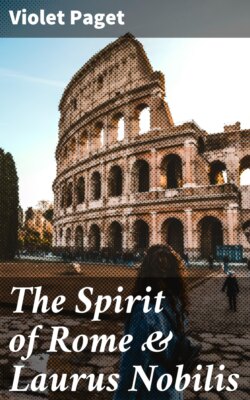Читать книгу The Spirit of Rome & Laurus Nobilis - Violet Paget - Страница 6
На сайте Литреса книга снята с продажи.
IV. ARA CŒLI.
ОглавлениеTable of Contents
Ended the morning characteristically at Ara Cœli, one of the churches here I like best, or rather one of the few I like at all. I find that the pleasure I derive from churches is mainly due to their being the most inhabited things in the world: inhabited by generation after generation, each bringing its something grand or paltry like its feelings, sometimes things stolen from previous generations like the rites themselves with their Pagan and Hebrew colour; bringing something, sticking in something, regardless of crowding (as life is ever regardless of other life): tombs, pictures, silver hearts and votive pictures of accidents and illnesses, paper flowers, marbled woodwork pews, hangings. And each generation also wearing something away, the bricks and marble discs into unevenness, the columns into polish, effacing with their tread the egotism of the effigies, reducing them to that mere film, mere outline of rigid feet, cushioned head and folded hands which is so pious and pathetic.
Such a church as Ara Cœli—like those of Ravenna—has this character all the more, that its very pillars are stolen from antique edifices, and show, in their broken flutings or scarred granite, that the weather also has felt its feelings about them, that they have shared in the life not merely of this religion or of that, Pagan or Christian, but in the life of the winds and rains. Such churches as this, anything but swept and garnished, correspond in a way to Browning's poetry; there is the high solemnity brought home to you, not disturbed, by the very triviality of the details; mysteries and wonders overarching the real living life of ex-votos and pictures of runaway horses and houses on fire; the life worn like the porphyry discs of the pavement, precious bits trodden into the bricks, the life of the present filched out of the past, like the columns of the temple supporting arches painted with seventeenth-century saints.
The organ was playing to the chanting of the monks; and standing before the chapel of S. Bernardino, where the Christ in the gold almond and the worshipping and music-making angels of Pinturicchio rise out of the blue darkness behind the grating, I felt oddly that music of the organ. The sonorous rasping of the bass tubes, the somewhat nasal quaver of the vox humana and the hautboy, was actually the music made by these beribboned Umbrian angels, those long ages ago, in the gloom of their blue cloudy sky, with the blessing, newly arisen Christ in the cherub-spangled gold almond among them.
Holy Saturday.
